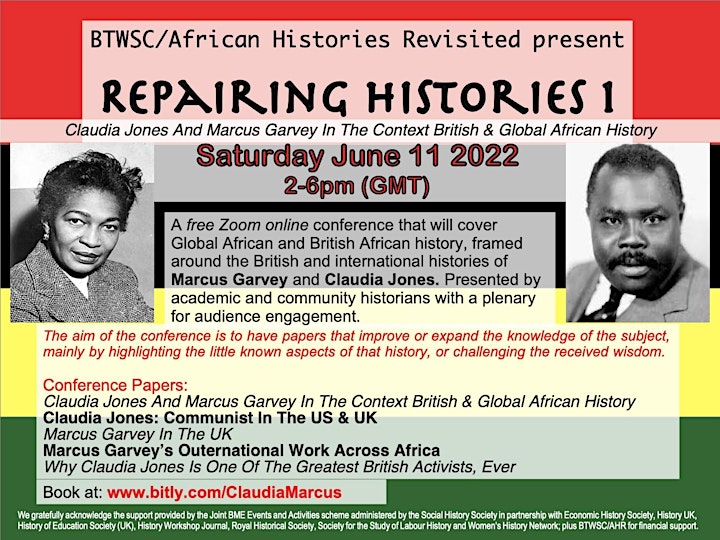Highlighting Claudia Jones and Marcus Garvey in the context of British and Global African history; and to improve or expand our knowledge.
Book at: https://bitly.com/ClaudiaMarcus

Questioning what we call ourselves as people of African heritage in Britain

AFRICAN HISTORY SEASON 2021
We're repeating much of last year's Monday Xtra History Sessions, plus some additions. It takes place on Mondays Sep. 27, Sep. 30), Oct. 4, 11, 18, 25, Nov. 1, 8, 15, 22, 29, Dec. 6, Dec. 13 and Dec. 20 2021, 6-9pm. Check for updates at: https://AfricanHistoryPlus.eventbrite.com
You can book individually or get 30% off if you book the first 11 of the events in one go, by booking MondayXHS2021 1st 11 Events Discount Hub here. Plus 35% off discount by booking all 13 events in one go here.
Confirmed programme:
Sep. 27 What's British African History? A Free Online Discussion Forum - click here to book. £Free
Sep. 30 (Thursday) Police & Criminalising Of African Youths guest presenter Dr Adam Elliott-Cooper - click here to book
Oct. 4 THE Reggae Fun, History, Music, Quiz & Prizes Event! guest presenter Colin 'CeeBee' Brown - click here to book
Oct. 11 Interrogating Language 4: Identity, Decolonising, Reparations; Araning & Pan-Africanism: Should Africans Have African Names? - click here to book
Oct. 18 London African History Through Representations In The Capital - click here to book
Oct. 25 Today Brixton Is Locked Off: The Day Black Lives Matter Shut Down Brixton - click here to book
Oct. 27 (Wednesday) Racism, Crime And Policing In The Johnson-(Cummings)-Sewell/Dick Moment! presenter Cecil Gutzmore - click here to book
Nov. 1 Where Would Reggae Be If It Were Not For Migration? click here to book
Nov. 8 Police & Criminalising Of African Youths 2 guest presenter Cecil Gutzmore - click here to book
Nov. 15 1974: That Carib Club Story And Other Clubland Horror Histories - click here to book
Nov. 22 Marking The Centenary Of 1921 Pan-African Congress In London - click here to book
Nov. 29 The True History Of African/Black History Month In The UK - click here to book
Dec 6 African History In Britain: Those Who Built The Foundation - click here to book
+
Dec. 13 The Men With Ships And Preaching Back To Africa Before Marcus Garvey - click here to book
Dec. 20 UK African Women Self-Organising (Marking the 57th anniversary of the passing of Claudia Jones. Special guests t.b.c) - click here to book
BTWSC/African Histories Revisited events can be accessed via:
AfricanHistoryPlus.eventbrite.com
and our partner
BBM/BMC (BritishBlackMusic.com/Black Music Congress) events can be accessed via: BBM.eventbrite.com
Follow us on Eventbrite.com. ALL 2021 events are via Zoom
Highlighting Inspirational British African Women With A South London Twist
By Kwaku
Of the women highlighted here, Dame Jocelyn Barrow, is the only one who did not live in south London. However, she's left an enduring legacy in south London, particularly in Brixton.
The event was inspired as the library's tribute to Trinidadian-born educationalist and community activist Dame Jocelyn Barrow (15 April 1929 – 9 April 2020), who died last April a few days short of her 91st birthday.
Although a Camden resident, Dame Jocelyn was a patron of Brixton-based Black Cultural Archives, and has a fascinating story about her education and activism work in south London.
She used her profession as a teacher and teacher trainer to develop literacy skills among working adults at community projects. It was on a visit to Brixton to deliver such work that she discovered the colour bar in the local Marks & Spencer. Although there were several African people in the store, she noticed none of the sales staff was African or non-European.
Noticing an in-store publicity for sales staff, she decided to go through the motions of applying for a position. When the manageress said there were no vacancies, not only did she tell the manageress to then take down the vacancy notice, she also made sure the manageress saw a personal letter to her from Lord Sieff, then chairman of the Marks & Spencer.
Suffice to say, it wasn't long before Africans were being employed in that branch. So we owe the now common sight of people from AAME (African, Asian and Minority Ethnic) communities serving in Marks & Spencer in Brixton, and also in the West End, to the efforts of the anti-racism campaigner Dame Jocelyn.
I was blessed to have been invited to her 90th birthday, having built a cordial relationship with her since filming her as one of the seven subjects of my 2009 DVD entitled 'What They Said I Should Be: The Story of African British Female Movers & Shakers'.
She's not only an accomplished gospel singer and songwriter, but also a public speaker and author. In addition to promoting “economic empowerment”, her parting shot that, like Dame Jocelyn, we must ask ourselves: “What can I do? What have I got to give?”